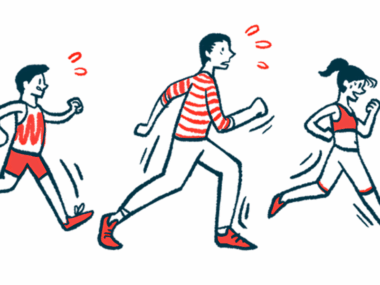MS treatments don’t cure my disease; they just make it quieter
The goal is to ease symptoms and make life more comfortable
Written by |

I’ve written several times before about how unpleasant it was to catch giardia while serving in Afghanistan with the U.S. Army, but I wasn’t the only person to get sick from drinking contaminated water. On one mission, we’d gotten up far too early to make coffee and had some tea brewed during a lull by our Afghan brethren instead. They said that they’d made it with bottled water, but something got lost in translation.
What we found out later was that the water had come from a bottle, but said bottle had been filled from the local river/laundromat/car wash/livestock watering station/restroom. I handed out an antibiotic chaser to all the tea drinkers, but apparently I didn’t get to everyone in time because, later that evening, one of my teammates became violently ill.
I don’t mean that he was violent — he was much too weak — just that the sounds coming from the top and bottom ends of his body were a little scary and violent-sounding. When that had settled, I gave him more antibiotics and started an IV to rehydrate him. He glanced up while I was adding a powerful and sedating anti-nausea medication to his IV and asked, “Is that going to make me better?”
I considered this question carefully before replying, “Well, it’s certainly going to make you quieter.”
My bedside manner was the stuff of legend.
Quieting my MS symptoms
Since I was diagnosed with multiple sclerosis (MS), those words have often come back to haunt me. It hurts a little to think that my disease-modifying therapies (DMTs), along with the medications I take to control MS symptoms, do exactly that. My DMT doesn’t cure MS, and the meds for my symptoms ease but don’t eliminate them. The drugs simply provide some relief, buy me time, and make me quieter.
Surprisingly, I’ve made peace with that.
I didn’t think I would at first. I wanted a cure and a complete restoration of the person I was before MS. Unfortunately, that’s not in the cards yet, and I’m gradually learning to accept that.
Ocrevus (ocrelizumab) isn’t eliminating my disease, but the DMT seems to be keeping it stable, which is the equivalent of making it quieter. My intrathecal baclofen pump doesn’t wipe out my spasticity, but it does lessen it, and for now, I suppose that’ll have to do.
In the past, I’ve been skeptical and even scoffed at some of the alternative treatments for MS. I still do when it comes to anything that claims to cure or reverse the disease as long as you’re willing to pay. I don’t mind anyone making money from their research and work, but I have a special disdain for people who deliberately prey on the desperation of those suffering from a disease.
Your particular diet or other alternative therapies may not work for me at all, and mine may not work for you. We’re all different, and our MS is unique to each of us. At the end of the day, if what you’re doing is safe, makes you feel better, and isn’t making you destitute, then it’s making you quieter. That’s a good thing, and I would advise that you keep doing it.
I’ve shared that I’m now in therapy to treat the depression stemming from my life with MS. When I started attending therapy, I honestly thought that there’d simply be a quick assessment followed by a prescription. No real cure, just a treatment to make my sadness a little quieter.
To my utter delight, that’s not what happened at all. The sadness is still being quieted, but with therapy to make me aware of it and to help alleviate it. My symptoms may come back and an antidepressant could be in my future, but I much prefer this way of quieting my depression.
My MS isn’t gone by any means, but I’ve chosen and continue to choose ways of making my symptoms quieter.
Please don’t misunderstand me: Making my life more comfortable is the quiet that I’m talking about. I write a weekly column about MS, participate in several forums, advocate, research, and continue to ask questions. Obviously, when it comes to those concerns, I have no intention of going quietly.
March is MS Awareness Month, and MS News Today is asking for guest column submissions from people with the disease or those affected by it. We need one submission for each of the month’s 31 days. Please consider submitting one and sharing your thoughts.
Note: Multiple Sclerosis News Today is strictly a news and information website about the disease. It does not provide medical advice, diagnosis, or treatment. This content is not intended to be a substitute for professional medical advice, diagnosis, or treatment. Always seek the advice of your physician or other qualified health provider with any questions you may have regarding a medical condition. Never disregard professional medical advice or delay in seeking it because of something you have read on this website. The opinions expressed in this column are not those of Multiple Sclerosis News Today or its parent company, Bionews, and are intended to spark discussion about issues pertaining to multiple sclerosis.




Cecilia
Your statements are so true! Every person seems to experience a completely different desease, the symptoms really are that different! I have been very lucky, although I was diagnosed over 20 years ago, and I have gone without medication, I am still able to work and most days I can almost forget that I have the MS spade hanging over my head. I would like to see a cure, but I am even more interested on research regarding how to stop the progression. I also have three children and worry about the possibility of the disease laying dormant in their genes just waiting for an opportunity to attack them…
Benjamin Hofmeister
Hi Cecilia! Out of everything you said, your comment about your children really resonated with me. We've got three too and I worry about how much I may have increased their chances of having MS. I know what the data says and I comfort myself with the knowledge that I really have an increase in by that much, but it still a major concern of mine. I have no family history, so I'm more concerned with not exposing them to any of the possible triggers that I encountered.
Jan green
From one MS OG to another, you rock. I’m running on no DMT for a year and hoping for a break.
Benjamin Hofmeister
Thanks Jan! Is that what we are? OGs? 😆 whenever I have a spasm, my hands definitely throw some MS gang signs but other than that, I'm not sure that I really qualifiy as an OG.
Mark
Always love your column, keep up the good work and keep up the fight
Benjamin Hofmeister
Thanks for reading Mark! I will do my best to keep up the fight, as long as there are people like you fighting alongside me
Karen
After going through emails today 1/17/2025, the title of your article jumped out, among the other discussions in my mail. Verbal diagnosis of MS in 1973, by wonderful doctors who told me at the time, we think you have multiple sclerosis, though we have no tests to confirm our suspicions. My fortunate hide and seek behavior of my MS enabled me to raise 2 children, work 5 years cutting hair and 22 years in development. Your description of DMT’s quieting your MS are spot on and mine the same. I am thankful that when asked how I’m doing, my ‘I’m fine’ defines my day to day challenges that I can manage… and things out of my reach, I have peacefully let go of. We have dear friends whose MS has not been so kind and my hands, though shaky, are always there to support them in their journey. I am grateful for the quiet and thank you for your article..
Benjamin Hofmeister
You are very welcome Karen. Thank you for taking the time to read it and comment. What you said about managing, not just the symptoms of MS, but life with it is spot on. I don't always feel right when I tell people that I'm fine, but I think I feel completely honest when I say that I'm managing.
Merlene Cook
My intake of a small dosage of an anti depressant has proven to to make me quieter within. Stronger and stable is the plus. I do this for myself. If others benefit that is OK too. There is a stigma around those who rely on anti depressant pills. I too thought it as a weakness. Not so. ...... Makes me a better person navigating with MS. Thanks for your words.
We are fortunate we have you to make some sense of this disease. You have turned into a purpose. Sadly without you having MS, many of us would not feel a sense of community. It now has become your a different but vital purpose in life. Speaking for the community ... big thanks.
Benjamin Hofmeister
I had my first major depressive episode about a year after diagnosis, when the weight of it all settled on me. I was still in the Army at that time and started a low dose of an antidepressant. I'm still not sure if it helped the most, or going to work and telling everybody what was going on helped more. My friends were very supportive even though they told me that if I ever kept anything like this from them they would take me outside and kick my butt. For me that was exactly what I needed to hear and I was able to discontinue the antidepressant after a year.
Anna
Hi Ben,
I haven't been here for a while but I've read your post with much attention and understanding as I also struggle with this disease. Don't you think though that depression may not only be the result of the fact that MS is a debilitating disease and seeing our bodily functions deteriorate could make us depressive, but that depression may be another symptom of MS??? Being a neurodegenerative disease, MS damages our neurons in the brain and the spinal cord, which may disturb the release of different neurotransmitters. I personally feel like I am a different person when I am on antidepressants, my mood stabilizes, I don't have emotional outbursts and I also have more energy. Therapy doesn't seem to work at all on me, only medication.
Keep well. Anna
Benjamin Hofmeister
Hi Anna! I definitely think that the damage to our nervous system from multiple sclerosis plays a role in our overall mood. The damage this disease does to our physical selves and our abilities and social life definitely plays a role too, but I don't think anyone should ever discount the damage Done to our brains.
luis
Nice
Brendan G
Thanks for the article. It is a key point in that ‘quietening’ MS is a clearer way to not only ‘accept’ the condition but to positively work towards ameliorating effects - to live a more positive life. And that in itself improves self and outcomes!
Susanne Jones
It sure as heck does not make mine quieter! Sick of taking 2 or 3 others to manage the DMT!